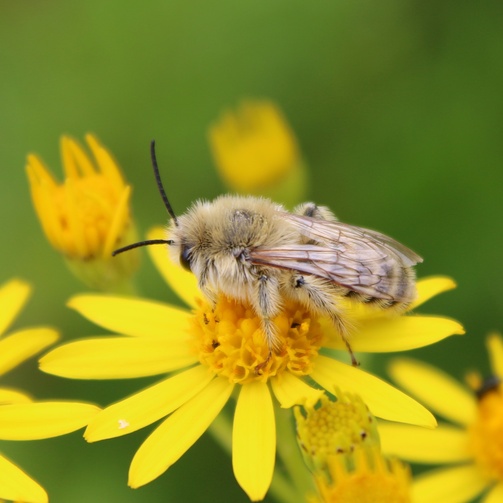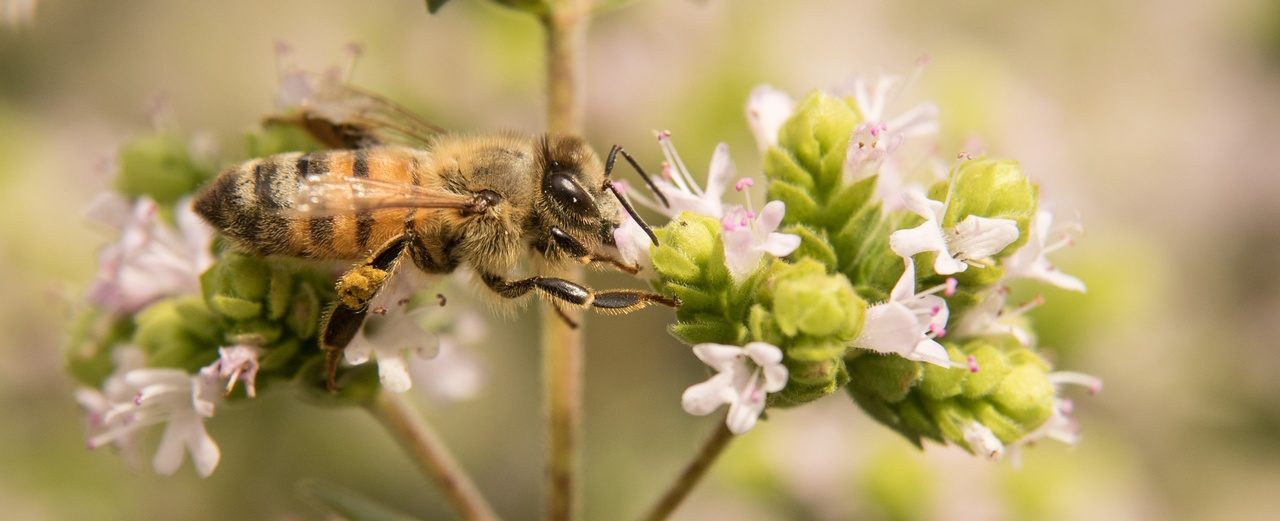 Urban islands of blossoms
Urban islands of blossoms
Meadows of wild flowers for bees
"So, all we need now is a watering can full of water," kindergarten teacher Jens explains to the 12 preschool children of the Frankfurt nursery. In the last four weeks the kids have been involved with bees and flowers. Today they went to work on a previously unused plot of land right next to the nursery. A 20 square metre flower meadow for bees and other insects is being created here. Six-year-old Julia is allowed to tie the sign to the fence with some sturdy string. There it is, for all to see: a little paradise for bees and humans! ‘Just a week ago this spot was a place where passers-by carelessly dropped their litter and the city didn't care,’ says the teacher. ‘Now the children have transformed it into a hopefully soon to flower meadow for wild bees.’ Jens and the children are already looking forward to observing the wild bees on the new meadow in summer.
Necessity
Flowering meadows for protecting endangered wild bees and other insects.
Activity
Derelict plots and deserted lawns in cities transformed into wild flower meadows in cooperation with schools and nurseries.
Countable effort
Number of square metres that are transformed into wild flower meadows.
Result
Wild flower meadows provide a habitat for wild bees and wild bee species have established themselves there.
Systemic effect
The habitat of wild bees and other insects has expanded long-term and biodiversity in cities has been preserved.
Background
Bees and insects in Germany are under threat: Since 1989, the number of insects has fallen by around 80 per cent (NABU, 2019). The number and diversity of bees, bumble bees and other pollinators has also fallen dramatically. More than half of all bee species in Germany are already listed on the so-called 'Red List' of endangered animal species. More than 30 species are even threatened with extinction (BUND, 2019). In Germany, many natural habitats of bees are affected and partially destroyed by industrial agriculture and urban development. On farmland there is often only a single crop and in cities more and more natural habitats such as wildflower meadows are disappearing. For bees and many other insects, however, natural wildflower meadows are of great importance. They serve as a major source of food. Also, bees pollinate around 80 per cent of all fruits and vegetables (BMU; 2019). To preserve biodiversity in the cities and create a habitat for the bees, it is therefore necessary to create many such small green spaces.
The good deed
With today's good deed you are supporting the Initiative Bienenretter which, together with nurseries, schools and committed citizens, is transforming derelict land and unused fields into ecologically valuable wildflower meadows. To this end, sets of seeds containing bee-friendly wildflowers and educational materials are provided. Educators and teachers can incorporate the seed campaign into their lessons or project week. Children learn in a playful way how important the pollination by bees is for nature. Every good deed, creates up to three square metres of species-rich wildflower meadow which combine to form an urban network of green spaces. The cities bloom, the quality of life for humans is improved and the habitat for endangered bees is protected.

AboutGermany
Berlin
82,100,000
46,136
Placed 5 of 189
Intensive agriculture and the rise in urban density are displacing insect habitats. About 300 of the 560 species of wild bee and a third of wild plants are currently on the Red List of Threatened Species.
About the organization and further information
FINE Frankfurter Institut für nachhaltige Entwicklung e.V.
Website

Further information and source
- FINE Frankfurter Institut für nachhaltige Entwicklung e.V, 2019. Bienenretter Bildungs- und Ökologieprojekt.
- IPBES, 2019. Bericht des UN- Weltbiodiversitätsrats zum Zustand der Bestäuberinsekten
- IPBES, 2019. Deutsche Zusammenfassung IPBES Bericht (PDF)
- Bayrisches Staatsministerium für Ernährung, Landwirtschaft und Forsten, 2019.Verbesserung der Bienenweide, Bay. Anstalt für Wein- und Gartenbau.
- NABU, 2019. Weniger Bienen, Fliegen, Schmetterlinge.
- Bundesministerium für Umwelt und Naturschutz, 2019. Bienen - kleine Superhelden.
- BUND, 2019. Wildbienen sind vielen Bedrohungen ausgesetzt - und auf Schutz angewiesen.
- Katherine C. R. Baldock et al, 2019. A systems approach reveals urban pollinator hotspots and conservation opportunities.




